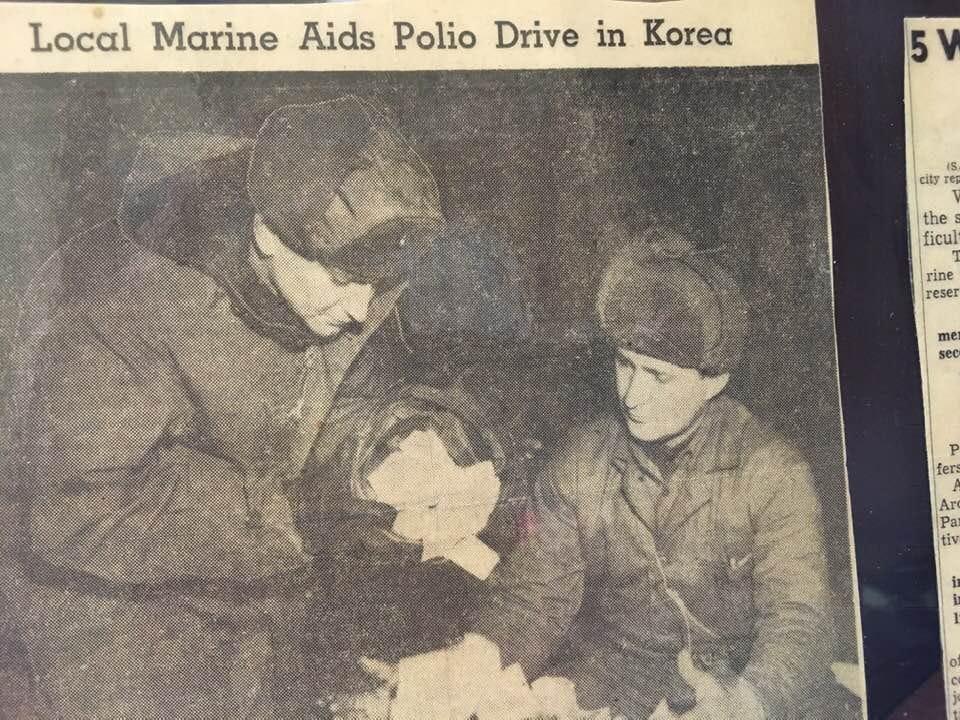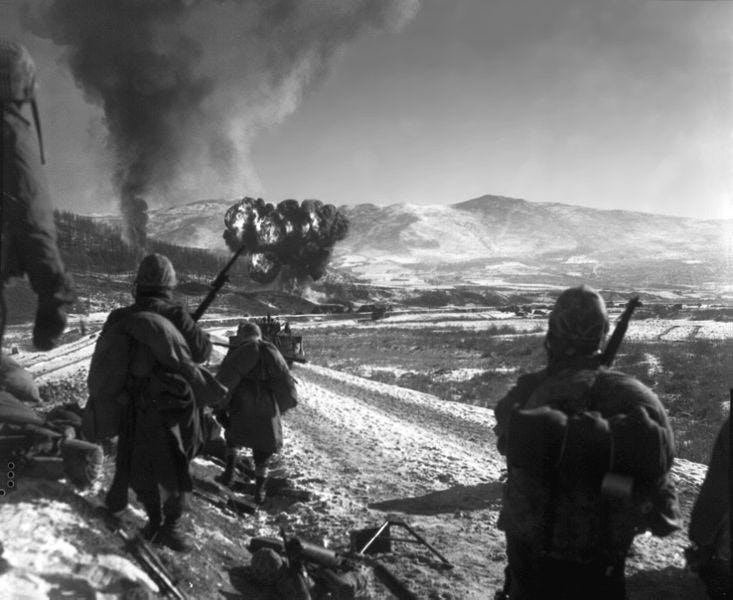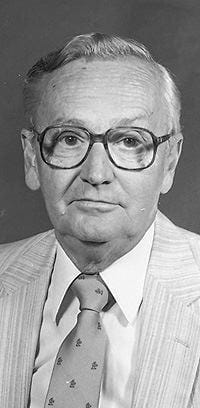A patriot journalist
World War II, Korean War combat veteran Bob Case held public officials accountable
I attended my first state newspaper convention in more than 40 years last week. It reminded me of a great moment by an esteemed colleague at a similar convention more than 40 years ago. And it made me smile.
The 1980 Iowa Daily Press Association convention in Des Moines featured an election debate between incumbent U.S. Sen. John Culver and his challenger, U.S. Rep. Charles Grassley, who for several years had represented the old Third Congressional District in our part of Northeast Iowa.
The candidates fielded questions from a trio of journalists including Ken Sullivan of the Cedar Rapids Gazette; Harrison “Skip” Weber, IDPA news director; and my once and future Waterloo Courier colleague, Bob Case.
One of the issues at that time was the proposed Equal Rights Amendment to the U.S. Constitution. When asked his view of the ERA, Grassley demurred. He said it was constitutionally a matter for the state legislatures to decide and did not want to presume to influence that process.
That didn’t satisfy Bob Case.
“Congressman Grassley,” Bob said, in a commanding, measured tone, “If I tell you what I think about the ERA…will YOU tell me what YOU think about it?”
The room exploded in laughter and applause. Grassley remained resolute in his position. It was clear at that point who won the debate.
It was not John Culver. It was not Charles Grassley. It was Bob Case. With his question, Bob had respectfully but firmly got his point across and attempted to hold Grassley to account — with flair and wit. It was vintage Bob Case.
And four years later when Bob’s Courier colleagues sat together at his funeral in Cedar Falls, then-Senator Grassley came over and shook several of our hands in condolence.
Senator Grassley’s gesture spoke volumes about Bob Case - more than Bob ever would have said about himself. The Courier and the state of Iowa had lost one of their finest political reporters ever.

I had the privilege of working with Bob for a few months as a student intern in the summer of 1978 and another few months after I was hired full-time at the Courier in 1984, prior to Bob's death at the all-too-young age of 59.
Bob was well-known throughout the state. Working with Bob, like interning for Skip Weber, was, for me, like being a rookie for the Yankees playing with Roger Maris. Bob was totally fearless in his reporting.
Bob had attended Drake University. He was a Republican and, between a couple of stints at the Courier, worked as an aide to longtime Congressman H.R. Gross – Grassley’s predecessor. When Gross retired in 1974, Bob ran for his House seat and lost in a primary to Grassley, after which Bob returned to the Courier.

Despite his known political affiliations, Bob was totally fair and even-handed in his reporting on politicians of all persuasions and universally respected. And he wasn’t afraid to read the tea leaves.
For example, when quixotic Cedar Falls typewriter salesman and Mensa member Gerald Baker polled in the double digits against incumbent U.S. Sen. Dick Clark in the 1978 Democratic primary, Bob suggested in his column that Clark was in trouble. Bob was right. Roger Jepsen unseated Clark that November.
In early 1984, Bob secured an exclusive interview with President Ronald Reagan aboard Air Force One during the president's re-election campaign stop in Waterloo.
In addition to being a fine journalist, Bob also was a patriot.
He served in the U.S. Marine Corps in World War II and Korea. He participated in the battles at Tarawa in the Pacific in WWII and at Chosin Reservoir in Korea -- and sent the Courier first-person accounts of that latter battle from the field.

Bob’s stories from the bloody frozen hell of Chosin Reservoir were simply heartbreaking. They still are today.
Here is a brief one of them:
Waterloo Courier Dec. 13, 1950
“Marines Back from Valley of Death Earn Cooked Meal”
By Sgt. ROBERT E. CASE
2nd Battalion, 5th Marines
HAGARU-RI, North Korea – They came back from the Valley of Death last night, the gallant troops of the First Marine Division.
Wounded and frozen, exhausted and hungry, they fought their way back against odds too overwhelming to believe.
But they came back.
And they left no man to be murdered by the fanatical Chinese Communists. Marines just don’t leave their wounded behind.
Through the mountains, down the roads they fought. The wounded and frozen battled like men with super-human strength.
The trip, covering 12 miles, took three days and it was a fight for life every step of the way.
Courage and heroism were commonplace. A man’s personal safety often was sacrificed to aid a buddy.
Hot chow was the reward for these gallant men – the first hot chow in several days.
Mere words just can’t describe what it’s like here. You have to see it.
Take a look at the men trying to drag themselves along on frozen feet. Watch the wounded, suffering not only from the pain of their wounds but from exposure as well.
Look at their eyes, swollen and red. Will the horrible picture of this ever leave their minds? Never!
There is temporary safety here, but not for long. Another trip lies ahead. Perhaps it will be easier, perhaps it won’t.
Yes, we are forced to fall back again. This time down the mountains some 60 miles toward Hamhung.
But the wounded will be flown out, thanks to the hard working Marine engineers who have chopped an air strip out of this frozen land.
And those of us on foot will make it. God will be with us every step of the way.

Bob made it out of Chosin, and made every moment of the rest of his life count.
It’s what made him a good public servant as a congressional aide and a dauntless guardian of government accountability and public trust as a journalist.
I can remember one occasion – of many – in the Courier newsroom, when Bob was on the phone in a testy conversation with a politician. Bob barked into the phone, “I’m getting tired for this three-ring circus!” and he held the listening end of the receiver away from his ear, as we all heard the flummoxed politician’s bluster.
It was great theater. And, of course, Bob had a smirk on his face, knowing he had gotten under the guy’s skin.
Bob had a very wry sense of humor. He was fond of quoting Prince Otto von Bismarck, who said, “A connoisseur of politics and sausage should not watch how either is made.”
In October 1984, Bob suffered an ultimately fatal heart attack after delivering a program to a group of students at Northern University High School on the University of Northern Iowa campus in Cedar Falls. I and some of my Courier friends were in the waiting room with Bob’s family outside his room at Sartori Hospital when a blood clot broke loose and he suffered a massive coronary. He died early the next morning.
Bob was buried with full military honors and condolences from politicians and government officials far and wide.
Thinking about it now, all these years later, it seems appropriate that Bob’s final public moments were spent educating young people about how democracy works; how every citizen has the liberty and responsibility to hold government officials accountable for their actions; and how democracy demands an informed public.
It’s appropriate because Bob not only believed in that democracy and liberty — he was willing to lay down his life in battle to defend it.
Iowa Writers’ Collaborative Columnists
Laura Belin: Iowa Politics with Laura Belin, Windsor Heights
Doug Burns: The Iowa Mercury, Carroll
Dave Busiek: Dave Busiek on Media, Des Moines
Art Cullen: Art Cullen’s Notebook, Storm Lake
Suzanna de Baca Dispatches from the Heartland, Huxley
Debra Engle: A Whole New World, Madison County
Julie Gammack: Julie Gammack’s Iowa Potluck, Des Moines and Okoboji
Joe Geha: Fern and Joe, Ames
Jody Gifford: Benign Inspiration, West Des Moines
Beth Hoffman: In the Dirt, Lovilla
Dana James: New Black Iowa, Des Moines
Pat Kinney: View from Cedar Valley, Waterloo
Fern Kupfer: Fern and Joe, Ames
Robert Leonard: Deep Midwest: Politics and Culture, Bussey
Tar Macias: Hola Iowa, Iowa
Kurt Meyer, Showing Up, St. Ansgar
Kyle Munson, Kyle Munson’s Main Street, Des Moines
Jane Nguyen, The Asian Iowan, West Des Moines
John Naughton: My Life, in Color, Des Moines
Chuck Offenburger: Iowa Boy Chuck Offenburger, Jefferson and Des Moines
Barry Piatt: Piatt on Politics: Behind the Curtains, Washington, D.C.
Mary Swander: Mary Swander’s Buggy Land, Kalona
Mary Swander: Mary Swander’s Emerging Voices, Kalona
Cheryl Tevis: Unfinished Business, Boone County
Ed Tibbetts: Along the Mississippi, Davenport
Teresa Zilk: Talking Good, Des Moines
We are proud to have an alliance with Iowa Capital Dispatch.





A very good Sunday morning read, Pat. Bob Case was a highly regarded member of the Iowa press corps and I learned more from him as a Bob Ray staffer than he likely ever learned from me. Thank you!
Great story Pat.